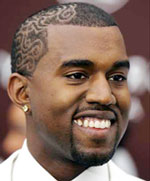CHARLENEM
Stardom is costly in a society where the well-known are worshipped

LOS ANGELES (FinalCall.com) – American society is obsessed with celebrities, whether it is Jay-Z and Beyonce, Ludacris, Chris Brown or Rhianna, rapper Kanye West and tennis star Serena Williams, or talk show host David Letterman.
Some popular culture analysts say the celebrity influence is strong because people get to relax, escape pressure and avoid the stresses of their everyday lives–at least for a moment.
But there is also an unhealthy pursuit of celebrity status and success that can take a huge toll on families, individuals, society and the stars themselves, say experts. Hip hop superstar West is not dead, despite a RIP (rest in peace) Internet hoax that began spreading on Oct. 20.
According to a post on billboard.com, the hoax was a set up as part of a Fox News web page that said the entertainer died in a bizarre crash in Los Angeles.
Celebrity obsession may have surfaced in a bizarre episode and wall to wall television coverage of reports about 11-year-old Falcon Heene of Colorado. CNN and others provided live coverage when it was said the boy may have been trapped in a moving flying saucer-shaped hot air balloon. Authorities accuse his parents of engaging in a hoax. Authorities say their hope was to gain status that might lead to a reality TV show. Parents Richard and Mayumi Heene, face possible criminal charges and may have to pay thousands in restitution for the cost of search and rescue operations to locate their son, who says he hid in a garage the whole time. According to news reports, Mrs. Heene told police the incident was a hoax.

“This is really society’s fault because we have placed so much importance on people who have fame and fortune until it’s given people a false sense of joy when they can even pretend to meet somebody, know somebody, talk to somebody, and it is really quite amazing,” said Dr. Gloria Morrow, a California-based psychologist.
People are living vicariously through celebrities and have linked celebrity to fortune, she said. Children think they can do very little to gain a lot, but they only see the limelight, and not the discipline, fortitude and hard work that celebrities put in to become famous singers or athletes, she said.
“Then the saddest part of this is a lot of young people, and old ones, aspire to become famous because they don’t really feel important in who they are. When you have a healthy self-esteem, and you work hard and you happen to become famous, that’s a great thing. And you still have a sense of balance, but I think people who are not feeling good about themselves, or their financial situations are sometimes ashamed about not having enough money and believe that the way out is to become famous,” Dr. Morrow said.
Celebrity interest becomes troublesome when people give too much of their attention to music, sports and other forms of popular entertainment, said Dr. Marc Lamont Hill, an associate professor at Columbia University.
“We lose sight of some of the biggest struggles and some of the most pressing issues of the moment and that becomes immature, irresponsible, and ultimately, for oppressed people, it can become deadly,” Dr. Hill said.
By deadly, the educator means either promoting a false reality, which drives people to do, say or buy things outside of their means to get what celebrity idols have. Or it can divert oppressed people’s attention away from forces impacting their lives on a daily basis that produce the same pressures they are trying to escape.
“At the moment where we’re more concerned with David Letterman than ramping up troops in Afghanistan, we are actually buying into a false reality that actually has a material impact on people around the globe. More people watch American Idol than the evening news. More people read gossip blogs than scripture, so when you live in a moment where those are the realities, you’re really seeing something that’s very, very dangerous,” Dr. Hill told The Final Call.

He was referring to the NBC late night talk show host, who admitted to having affairs with several staff members after a producer allegedly threatened to extort money from him.
Gossip TV and the 24-hour news cycle
Celebrity worship, coupled with the Internet and cable TV, have interfered with news cycles and have forced news media to vigorously compete for ratings, Dr. Hill continued. The news has always been slanted, but at least it was news, said Dr. Hill, who was a consultant on the Rupert Murdoch-owned Fox News Channel.
Now what passes for news can seem like a never ending deluge of gossip, paparazzi pics, rumors, sexual titillation and petty beefs overblown into major conflicts.
Over recent years, Dr. Hill continued, society has seen a 24-hour expansion of news, which sustains the public’s attention with arguing, fluff segments, sex and music–rather than intelligent, honest debate.
Instead of spending more time consuming news, information, and assessing the terrain that they are facing on every day, Black people spend more time engaged in that which is foolish and against nurturing their better selves, he said.
In order for the situation to reverse, Dr. Hill argued, people must own their own communications outlets, images, names and means of production. “That’s what makes Min. (Louis) Farrakhan so different. No one can tell him not to be Min. Farrakhan. No one can take away his platform, and I’m not critiquing other leaders because I’m in the same position. Fox News can pull the plug on me in five minutes. But you can’t take The Final Call, so it’s a whole different ball game when you own your own stuff and you manage your own platform, and there’s no intermediary between you and the people. That’s how you recover an image and maintain your legacy,” Dr. Hill asserted.
Fame as a force for good
Celebrity can also be a good thing. Entertainment and sports figures’ names and images have been used to encourage voting, raise funds for natural disaster victims, call for intervention in political and social conflicts, create and fund charities, youth programs, music and arts education, anti-violence campaigns and anti-AIDS efforts.
Rapper Ludacris, who supported Barack Obama for president and gave away cars through his foundation at an Atlanta-area dealership in September, appeared at the National Press Club in Washington, D.C., on Oct. 23 to promote community work.
Everyone can give back to communities, whether they are rich or poor, famous or not so famous, said Ludacris, whose foundation was having a dinner that night with Rep. Maxine Waters (D-Calif.) as an honoree.

“I like to help kids who want to help themselves,” said Ludacris in an interview with CBS News. His foundation, which is headed by his mother, offers arts opportunities to middle and high school students.
His foundation spent $100,000 helping people displaced by Hurricane Katrina who landed in Atlanta. His song “Runaway Love,” from his 2006 album Release Therapy, helped the National Runaway Switchboard through a partnership. The song was about the perils of a young girl on the streets after leaving home. “Any song I put out, I want to make it a movement, not just a single,” he said of the hit tune.
Celebrity and the cost of human failure
Still, since celebrities provide an escape from reality, their failures, changes or conflicts can seem devastating and are fodder for major media coverage–as well as ratings or page views which translate into increased ad income and more magazine or newspaper sales.
When singer Chris Brown assaulted his girlfriend and singer Rhianna before the Grammy Awards show in February, he faced more than legal ramifications. He was sentenced to five years probation, but he also lost endorsement contracts, including celebrity clothing lines, Wrigley’s Doublemint gum, and Got Milk? ads.
When tennis great Serena Williams had an angry outburst against a line judge at the U.S. Open in September, she was fined $10,500 and threatened with suspension.
When British Sugababes singer Keisha was replaced by Jade Ewen, the replacement shutdown her Twitter page after she was deluged with nasty comments about taking over for the last original member of the popular group. Likewise group member Amelle Berrabah reportedly received death threats and “thousands of abusive letters and whilst her Twitter page has been overrun with them,” according to a report in The Sun.
Fan anger exploded with accusations that Keisha, who started the group when she was 13-years-old, had been forced out by her jealous band mates.
Accountability or idol worship?
The lives of celebrities, their successes and failures can engender strong reactions from fans and the same society that raised them to god-like status. Calls for crucifixion can quickly follow a fall from grace. Some argue as role models for youth and public representatives of their communities, the stars must be held accountable.
Others say too much status, influence and responsibility are placed on people who achieved fame and may be unaware of their potential to do good or bad on a large scale.
Few sign-up to become a standard bearer for their generation or industry–which is often demanded of them.
Richard “Professor Griff” Griffin, an activist and member of the revolutionary rap group Public Enemy, said people first have to define what society means in order to determine the real impact of celebrity worship.
“There are different aspects of different societies. For example, if you’re talking about the demographic of young Black males from the age of, I can honestly say, three-years-old up until the time they’re 16, 17, then … it probably hits them a lot harder simply because to us, as Black people, we only have three, four ways out of the ‘hood,” Professor Griff told The Final Call.
Citing now-deceased rapper Notorious B.I.G. to make it out of the hood, you have to either sell crack rock or have a wicked jump shot, he said.
“We dream of actually becoming that person. We actually buy into the whole idea of the fan-tasy. It’s put to us as a fantasy and it’s used, especially when the star football player comes to the youth camp, or comes to your home town and you get the t-shirt, autograph and get to take the picture. You buy into the whole fantasy, not that we can even afford it,” Professor Griff added.
According to Dave “Davey D” Cook, a California-based hip hop journalist, another reason people worship entertainers and athletes is forceful marketing, like any other business or product. People can no more separate their admiration for a singer or rapper than they can for a car or tennis shoe, he said. The zeal in product marketing, consumerism and desire are the same for goods and celebrities, Davey D maintained.
“You have folks who won’t go to school, who’ll get up at six in the morning on a Saturday, where no commercials are playing, to get the newest Nikes. You have folks that will live in the hood, and can barely pay their electricity that will find money and resources and find a way to get a loan to get a Beemer (BMW),” Davey D noted.
He is optimistic that confronting these realities and contradictions can produce a more honest discussion about how to make mothers, fathers, pastors, preachers and teachers more admirable and highly sought out in communities.
But for now, weighing rapper 50 Cent against a teacher is like weighing a Mercedes Benz against a teacher and people are going to want what they want, he said.
Professor Griff believes mainstream society never uses worship of celebrities for anything positive. But, on the flip side, he believes Black people in the music and film industry–with their financial means–can write scripts and cast roles that use the talents of Black actors and actresses in more uplifting ways.












